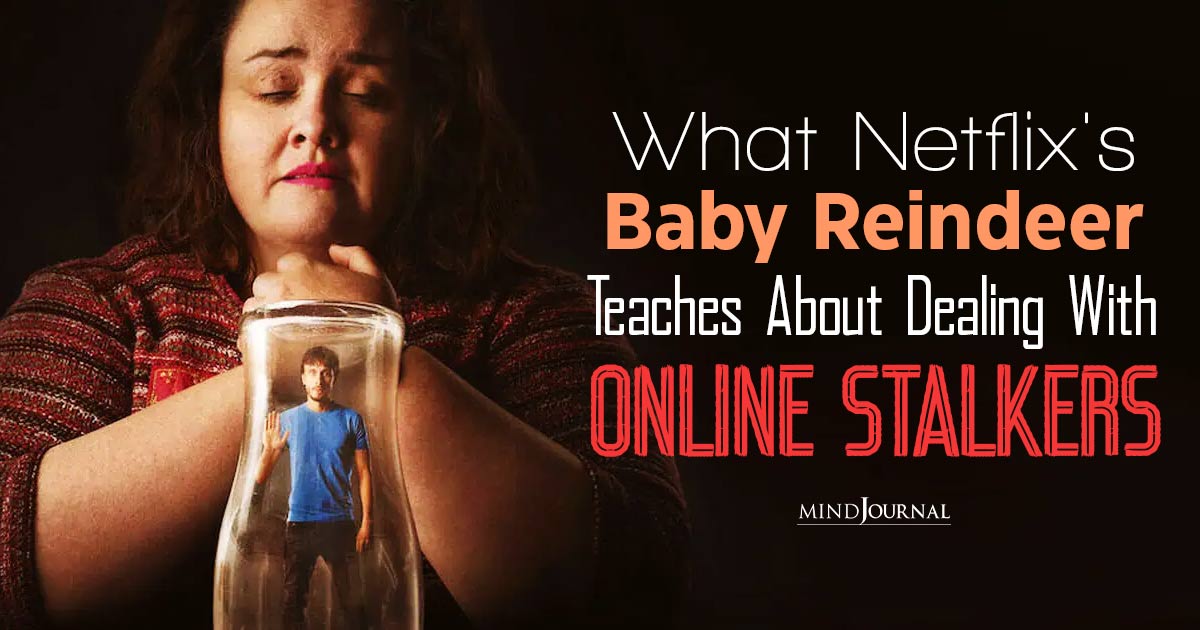“Baby Reindeer”, the British miniseries, hit on Netflix, highlights the horrifying truth of having an online stalker. Ever faced anything similar? If yes, read on to know more!
Baby Reindeer Netflix show is based on Richard Gadd’s autobiographical one-person play and tells the story of Donny, an unsuccessful comedian who becomes the target of Martha, a woman he meets at a local bar.
More or less 7.5 million individuals are cyberstalked each year based on the latest figures. This is also known as tech stalking, and about 80% all stalking victims experienced it while 67% were subject to traditional forms of stalking too.
Related: What Happens When You Have An Abusive Partner Stalking You

A study in the year 2020 has shown that one of the reasons why men do not report being stalked is because they are worried that nobody will take them seriously or believe what they say happened. The helplessness and infuriation that Donny feels during “Baby Reindeer” resonates with anyone who has ever been stalked online.
The Reality of Cyberstalking
Cyberstalking has become more common than traditional physical stalking. It can involve many different types of intrusive behaviors such as non-stop messaging, tracking your location, doxxing, catfishing and cyberbullying.
Cyberstalkers might be strangers or people you know like ex-partners or people from dating apps. In extreme cases, it may include making direct threats to harm you or contacting your loved ones.
How To Deal With An Online Stalker?
If you’re being stalked online, below are some of the important
1. Document Everything
Keep detailed records of every abusive act taken against you. Take screenshots of emails, text messages, social media posts or voicemails as digital evidence; ensure these records have sender’s name, recipient’s name(s), date sent/received & time stamp on them.
2. Increase Your Online Privacy
Make your profiles private by enhancing social media privacy settings & unfriend any suspicious profiles; change passwords frequently; block/unfriend suspected stalkers altogether from accessing information about where you live/work/go to school etc.; stop sharing future plans publicly or privately through messenger apps etc.
3. Contact Authorities
If there are threats made towards physical safety or harassment escalates beyond control then immediately contact your local police department; also consider taking legal actions since all states have laws against cyberstalking – speaking with a legal advocate about protective orders may help too.
4. Inform Friends and Family
Notify trusted friends/family members about what is happening so they can be vigilant if contacted by this person; having loved ones aware of the situation also provides emotional support for oneself during such trying times.
Related: Is Someone Watching You? Understanding Stalking Behavior
You Are Not Alone In This!
Wondering how to deal with an online stalker can be one of the loneliest experiences, but always remember that you are never alone in this.
Sharing your story with close friends or family members whom are trustworthy may help guide you through these dark moments. Taking proactive measures will greatly enhance your personal safety while granting inner peace too.
If you’ve watched Baby Reindeer Netflix or faced anything similar, share your thoughts below!









Leave a Reply
You must be logged in to post a comment.